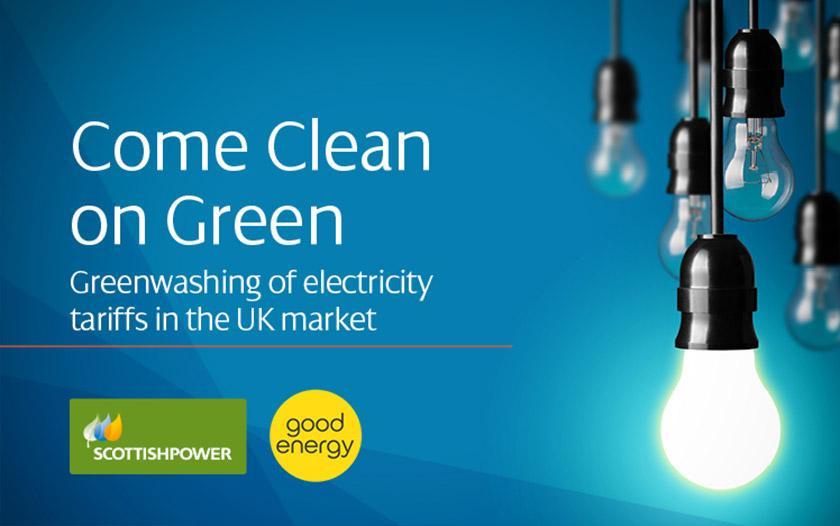- 100% green energy tariff suppliers ScottishPower and Good Energy join forces to voice concerns about greenwashing in the energy retail market
- First ever independent analysis of supplier activity by the Baringa consultancy finds that around a third of the electricity supplied through tariffs marketed as green or renewable in Britain is greenwashed
- Study exposes providers selling ‘certificate-only’ energy, which does not meaningfully benefit the environment, as ‘100% green’ – misleading consumers
- Rising interest in the climate emergency sees two-thirds of the public concerned about ‘green’ electricity tariffs which do not support true renewable energy sources such as wind farms
- ScottishPower and Good Energy urge the Government and Ofgem to close ‘greenwashing’ loopholes ahead of COP26 Summit in Glasgow in November
ScottishPower and Good Energy have launched ‘Come Clean on Green,’ a joint manifesto calling on the Government and Ofgem to close loopholes in the energy retail market, following the publication by the independent Baringa consultancy of analysis that establishes the scale of greenwashing in the sector for the very first time.

Baringa’s analysis, published last week, suggests that many current “renewable” energy tariffs provide little environmental benefit. Many of these greenwashed tariffs are offered by popular energy companies like Bulb and Shell Energy.
How Greenwashing works
Renewable electricity tariffs are growing rapidly in popularity as consumers strive to cut their carbon footprint and play their part in saving the planet. Harnessing this commitment will be vital to making progress towards Net Zero, but many commentators have started to question whether these tariffs are all as green as consumers might expect.
When green energy is produced in the UK or Europe, it comes with a certificate that authenticates the energy as renewable. However, these can be separated from their sources, and sold on their own, without connection to the renewable energy source or investment into green energy.
This means that the current rules around what can be described as a green tariff are extremely lax. As a result, many suppliers mislead customers by selling tariffs called ‘certificate-only’ deals – buying cheap certificates to greenwash power from non-renewable sources. Ahead of the COP26 Climate Summit in November, ScottishPower and Good Energy are calling time on a practice that is greenwashing energy and misleading the public.
Andrew Ward, CEO of ScottishPower Retail, said: “Consumers are being misled by too many energy companies. More and more people want to play their part in tackling climate change. They think they’re doing so by buying a green electricity tariff. Frustratingly, they’re often not. Snazzy marketing materials can’t make up for the fact that lots of these tariffs aren’t as green as they might seem.
“In November, Glasgow will host the UN’s COP26 climate summit. This is a huge opportunity for the UK demonstrate it is leading the way in green practices. If people see greenwashing taking place without action to combat it, it risks the UK’s position – hard won – as a world leader in green technologies and tackling climate change.”
Juliet Davenport, CEO and Founder of Good Energy, said: “Our new report shows the energy market is in drastic need of reform. Millions of customers are being misled by tariffs which do little to support green power, or tackle climate change.
“The answer is simple: Any supplier which is selling green power should be buying green power for their customers. People rightly expect energy companies to be upfront and honest with them. The industry can’t afford to lose their trust at this crucial time for climate action.”
Public Opinion is against greenwashing
Research from the Department for Business, Energy and Industrial Strategy (BEIS) also suggests greenwashing practices are increasingly out of kilter with public opinion. BEIS recently found that 81% of people are now either very or fairly concerned about climate change.
On the issue of greenwashed energy tariffs, new research by YouGov for ScottishPower highlighted that 66% of people would be concerned about signing up to an electricity tariff marketed as green, only to learn it failed to support renewable energy generation through the direct purchase of renewable electricity.
To put a stop to the damaging practice of greenwashing electricity tariffs, ScottishPower and Good Energy are calling on energy regulator Ofgem, and BEIS, to do four things:
- Improve transparency on green tariffs – make it a legal requirement to explain the type of tariff suppliers are really selling.
- Reform the ‘Fuel Mix Disclosure’ publication rules – ban non-Power Purchase Agreement-based tariffs from calling themselves green.
- Set minimum standards on what can be classed as green energy – produce detailed guidance for what can and can’t be defined as green.
- Close the loophole for foreign certificates – use the opportunity provided by Brexit to stop exempting suppliers who buy EU-based energy certificates from paying their fair share of UK renewable support costs.
The demand for renewable energy among consumers is growing fast – a trend which will only accelerate. As more and more people recognise that they can play a significant role in the action required to decarbonise our energy system and wider economy, the sector needs to be honest about what it is offering consumers. The current situation, where millions of customers are being mis-sold tariffs with little to no environmental benefit, needs to change.